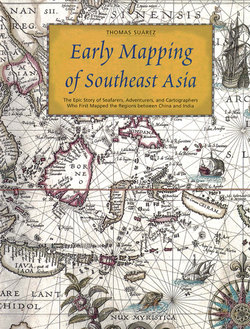Читать книгу Early Mapping of Southeast Asia - Thomas Suarez - Страница 7
На сайте Литреса книга снята с продажи.
ОглавлениеContents
| Introduction | 12 | |
| Part I | Southeast Asia | |
| Chapter 1 | The Land and Peoples of Southeast Asia | 16 |
| Origins and Influences; Arts and Daily Life; Gender; The Geography of Kingdoms and War; Religion; Colonialism; Continuing Change. | ||
| Chapter 2 | Southeast Asian Maps and Geographic Thought | 24 |
| Indian Influence; Earth and Geography; Travel, Trade and Statehood; Extant Southeast Asian Maps; Map Making Media; Principal Types of Southeast Asian Maps. | ||
| Chapter 3 | Asian Maps of Southeast Asia | 44 |
| India; China; Japan and Korea; The Arab View of Southeast Asia. | ||
| Part II | The Early Mediterranean and European Record | |
| Chapter 4 | Asia and Classical Europe | 60 |
| Greece; Rome. | ||
| Chapter 5 | Medieval Europe | 66 |
| Southeast Asia on Medieval European Maps; Paradise and Ophir; 'True' Southeast Asia on Medieval Maps. | ||
| Chapter 6 | European Pioneers | 74 |
| Europe returns 'Home' to Southeast Asia?; The Predecessors of Marco Polo and Subsequent Travelers. | ||
| Part III | The View from the Deck: Early European Maps | |
| Chapter 7 | Europe's Quest for a Sea Route to the Indies | 82 |
| The Geographia of Claudius Ptolemy; Dispelling the Myth of the Closed Indian Ocean. | ||
| Chapter 8 | A Confusion of Peninsulas and Dragon Tails | 90 |
| The Fate of Cattigara and the Great Promontory; The Life and The Death of The Phantom Peninsulas; Metamorphosis: The Martellus Dragon Tail 'Becomes' America. | ||
| Chapter 9 | Printed Maps Through 1538 | 100 |
| The names Taprobana, Java Major, Java Minor; Johann Ruysch (1507); Martin Waldseemüller (1513) and Vesconte Maggiolo (1507-16); Lorenz Fries (1522); Benedetto Bordone's Island Maps (1528); Sebastian Münster (1532 and 1538); Barro's Hand-Map. | ||
| Chapter 10 | First Maps from the Spanish Voyages 1525-1540 | 124 |
| The Magellan Voyage; Diego Ribero; Oronce Fine (1531); Sebastian Münster (1540). | ||
| Chapter 11 | Giacomo Gastaldi's Three Models 1548-1565 | 124 |
| The Three Types and Their Sources; Micronesia; The Philippines and Borneo; The Spiceries and Indonesia; The Mainland on the 1548 Gastaldi Map; The Mainland on the 1554 Ramusio and 1561 Gastaldi Maps; Chiang Mai, and Lake Chiang Mai; Other Works by Gastaldi and the Italian School. | 130 | |
| Chapter 12 | Tangling with Terra Australis and Snared by the Linea | 158 |
| Terra Australis; The Line of Demarcation and Southeast Asia. | ||
| Chapter 13 | 1570− ca. 1600: Diversity in a Transition to Standardization | 164 |
| Ortelius and Related Maps; The Curious Case of the 'Philippine' Island of St. John; Juan López de Velasco — Antonio de Herrera y Tordesillas; Other Islands and Island Books; Dutch and German Maps at the Turn of the Seventeenth Century; The 'Plancius' map of circa 1594; The Linschoten map of 1595; The Lodewijcksz Map of 1598; The Trans-Peninsular Waterway; The Miniature Atlases of Langenes and Bertius; Waghenaer's Chart of the Sunda Strait and the Transition to Printed Sea Charts and Pilot Books; The Role of England. | ||
| Part IV | Companies and Colonization | |
| Chapter 14 | The Advent of the East India Companies | 200 |
| India Companies; The English East India Company; The V.O.C. and Early Amsterdam Publishers; The Trend Toward Printed Sea-Charts; Italian and French Maps of the Later Seventeenth Century; Holland in the Latter Part of the Seventeenth Century; Spain Looks to Micronesia; Germany. | ||
| Chapter 15 | The Eighteenth and Early Nineteenth Centuries | 232 |
| François Valentijn and Johannes van Keulen; England and France; Spain and the Philippines; European Maps in Southeast Asia. | ||
| Chapter 16 | The Nineteenth Century and the Mapping of the Interior | 252 |
| Indochina; Burma and Thailand; Transition to the Modern Era. | ||
| Endnotes | 265 | |
| References | 272 | |
| Index | 275 |
